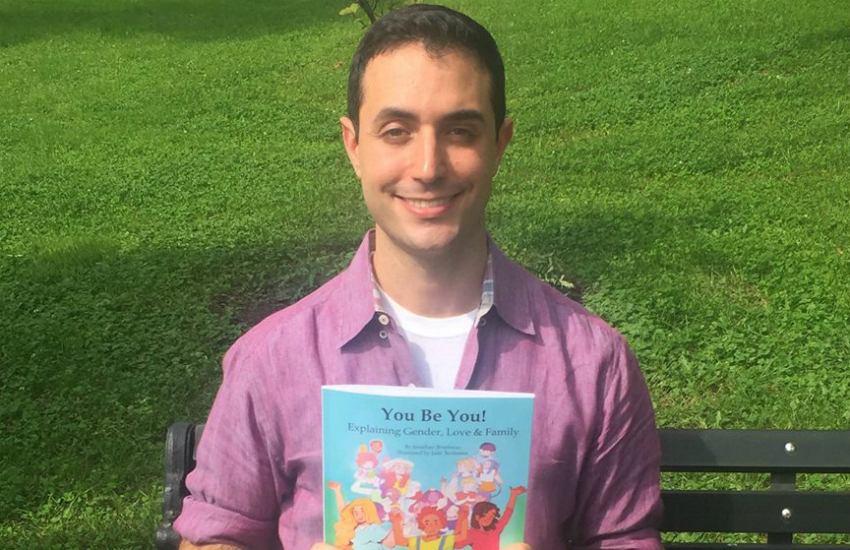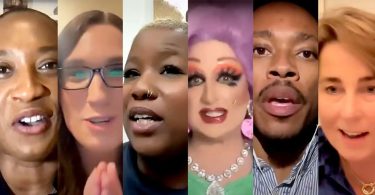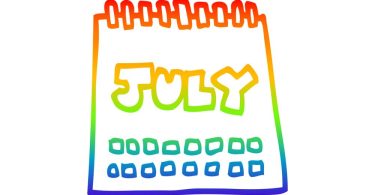Jon Branfman with his book, now available in Chinese, Arabic, and Spanish
You Be You! Explaining Gender, Love & Family by Jon Branfman and illustrated by Julie Benbassat is now available in three new languages—Arabic, Chinese, and Spanish.
These languages join the current line-up of 9 languages, plus English, that have translations. The book is also available in French, German, Portuguese, Japanese, Korean, and Turkish.
GSN spoke with Branfman about these translations and why they’re significant.
‘My first goal was to make “You Be You” accessible to as many people as possible, so I focused on the languages most widely spoken in the world, like Chinese, Arabic, and Spanish,’ Branfman says.
He notes that translations are currently being worked on for other languages, including Russian, Hindi, Italian, Polish, and Hebrew.
Translation process
‘I found each translator through my own network of friends and colleagues. It was crucial to find translators who had not just the linguistic skills, but also the cultural competency to thoughtfully translate topics of gender, sexuality, and family into each language,’ he explains.
‘I’m very lucky that my education and life experiences have helped me to build a network of international friends—for example, by working at a Jewish summer camp or attending graduate school. In this way, I’ve been able to find translators for every language that I’ve aimed for.’
‘Through friends and friends-of-friends, I was able to find wonderful translators who are members of the language communities into which they translated “You Be You,” and who understand the importance of respecting each region’s own sexual- and gender-minority communities and the terms people prefer to use for themselves.’
Each translation takes up to six months. During that time, Branfman makes sure that the translators ‘consult with sexual and gender minority communities in the given language to help choose the best terms.’
For instance, the Arabic translator, Aseel Houmsse, had to consider whether or not to use the term ‘Liwati’ for ‘gay.’
‘”Liwati” comes from the biblical character Lot, and carries a stigma similar to the term “sodomite” in English,’ Branfman says. ‘However, we ultimately chose to use this term because it’s one of the most commonly understood Arabic words for this concept. We hope that our book can help to destigmatize the term.’
Another linguistic struggle is coming up during work on the Hindi translation.
‘Many sexual and gender minorities in South Asia do not identify with Western terms like “gay” or “transgender,” and so our Hindi translation will address identities like hijra and kothi,’ he explains.
The significance
‘These translations are significant because they offer rare educational resources in each language community,’ Branfman states.
‘On one hand, it’s important to challenge the “Western savior” myth, a myth assuming that gender and sexual minorities in other regions are helpless victims. In every part of the world, sexual and gender minorities are striving in their own ways to live their lives, articulate their own identities, and to change their own societies.’
‘On the other hand, comprehensive educational resources like “You Be You” are very rare in many languages, including Arabic, Chinese, and Russian. Further, due to censorship like Russia’s law against “homosexual propaganda” (meaning anything LGBT-affirmative), many people in these language communities would face personal danger if they tried to create such a resource. By translating “You Be You,” my colleagues and I hope to offer a resource that sexual and gender minorities around the world can use, to pursue their own liberation as they see fit.’
Upcoming work
The two translations Branfman is most excited about are the Chinese and Hebrew ones.
‘Just last week, China had a very exciting turn of events: Sina Weibo temporarily suppressed all LGBT content, but then public pressure reversed that decision,’ he says.
‘I hope that the Chinese edition of “You Be You” can support this cultural shift toward LGBT inclusion.’
‘As for Hebrew, I’m excited because I’m Jewish. It’s extra meaningful to me that Hebrew-speakers will be able to read this resource, and I’m excited to read the Hebrew edition myself as well.’
Keep up-to-date with the translations of Branfman’s book on Facebook and Twitter.







